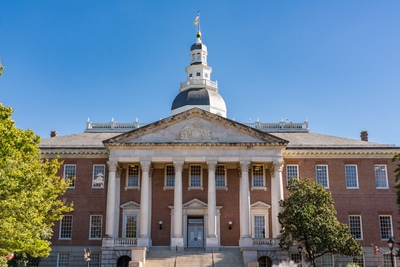
State Government Affairs, Elections & Campaigns
How Lieutenant Governors Are Selected (And Why It Matters)
December 10, 2025 | Bill Kramer
September 18, 2024 | Sandy Dornsife
-175144-1200px.jpeg)
Key Takeaways:
State high courts issue thousands of opinions each year, and these decisions can have major impacts on public policy. To help you keep track of consequential judicial decisions and their impact on state policy, MultiState publishes the Monthly Court Report, which offers a monthly recap of notable state high court decisions to provide a more dynamic picture of public policy trends.
The upcoming elections in November will undoubtedly have important political implications; however, the ramifications extend far beyond simply which candidates are elected. Currently, approximately 160 ballot measures are due to appear on ballots throughout the country. These initiatives make their way onto the ballot via various avenues, including by voter petition and legislative referral. As the election gets closer, the courts are increasingly being asked to determine whether and under what conditions some of the most contentious of these measures may move forward to the election.
With the uncertainty caused by the U.S. Supreme Court’s decision in Dobbs, it is not surprising that almost a quarter of the states’ ballots are set to contain a measure on abortion rights. This month, several state supreme courts delivered substantial wins to anti-abortion proponents in cases involving these measures.
In Arizona, pro-choice groups challenged the constitutionality of the language being used in informational pamphlets sent directly to voters by the state. The state supreme court held that these pamphlets may refer to an embryo or a fetus as an “unborn human being,” despite the lower court’s finding that the language was a violation of impartiality requirements for such material. The Court stated that since the pamphlet does not “either communicate objectively false or misleading information” or conceal the basic idea of the provision, it meets all legal requirements.
In another case in Florida, the state supreme court ruled that the language used on the ballot for an abortion measure could contain information issued by the state Financial Impact Estimating Conference including that the measure would lead to more abortions using state funds and lower state revenues as a consequence of fewer births. Pro-choice advocates had argued that the conference did not take into account the newly imposed 6-week ban which, if overturned, would decrease Medicaid costs and increase the financial success of women.
Finally, the Arkansas Supreme Court issued a split decision ordering that a proposed abortion-rights ballot initiative not appear on the November ballot due to the fact that the advocates failed to provide certain timely documentation related to paid signature gatherers.
Challenges to abortion ballot measures show little sign of slowing, with supreme courts in states like Nebraska and South Dakota still set to hear arguments on proposed measures. While the final version of ballots may still yet to be determined, it is all but definite that the combative nature involved in abortion legislation and the outcomes of the measures that make it to the ballot will bleed into the 2024 legislative session.
The Arizona Supreme Court reached a decision regarding a November ballot initiative, permitting the “Tipped Workers Protection Act” to remain on the ballot despite claims that the measure was deceptive. Advocates for raising the minimum wage asserted that the effect of the act would actually lower tipped workers’ wages and voters would be confused by the title of the act. Read more.
The California Supreme Court reached another influential decision regarding its contentious Private Attorneys General Act (PAGA), which authorizes employees to file suits against an employer to recover penalties on behalf of themselves, as well as other employees and the state. The Court reversed a lower court decision and held that PAGA’s reach is limited to the private sector, and does not apply to public entities. Read more.
The Delaware Supreme Court delivered a windfall decision for five law firms seeking to recover $267 million in legal fees from a $1 billion settlement for Dell shareholders. A group of the shareholders had sought to reduce the amount awarded to the firms by using a federal court model that reduces the percentage awarded as the settlement amount increases. The legal fees are some of the highest in the history of federal securities law. Read more
The Georgia Supreme Court broadened the purview of the Open Records Act, declaring that the law not only applies to governmental agencies but also private contractors for the agencies. The extension, however, only applies to those records relevant to the contractor’s public project. Read more.
The Massachusetts Supreme Court overturned a 1957 law banning the possession of switchblades. The Court stated that the ban was an unconstitutional violation of the U.S. Constitution’s Second Amendment right to bear arms as it was not “consistent with this nation’s historical tradition of firearm regulation.” Read more.
Michigan’s Supreme Court upheld its lower courts’ decisions dismissing the cases of businesses alleging that they were entitled to compensation from the government for the economic harm caused by COVID-19 emergency policies. Plaintiffs claimed that the policies amounted to a government “taking” for which they were entitled to compensation; however, the Court disagreed. Read more.
The Minnesota Supreme Court unanimously upheld a 2023 law restoring voting rights to released felons as the parties challenging the law did not have standing to bring the action. Plaintiffs had based their legal standing on the fact that they were taxpayers and tax funds were used to implement the law. Read more.
Montana’s Supreme Court ruled that Montana State University is not required to return tuition or fees paid by a student during the period in which the school was shut-down to in-person education during the COVID-19 pandemic. The Court reasoned that the school’s contract with the student did not guarantee in-person instruction at all times or that the school could not be shut down for a valid reason. Read more.
The Montana Supreme Court reached an important decision in abortion law, ruling that the government may not require a minor to obtain parental consent prior to receiving an abortion. The Court found that a minor’s right to privacy, which includes bodily autonomy, makes such a requirement unconstitutional. Read more
Nebraska’s Supreme Court found that the state’s delinquent tax sale process was an unconstitutional violation of the U.S. Constitution’s Fifth Amendment “takings clause.” In multiple instances, the state sold homes for tens of thousands of dollars more than the tax debt owed, but failed to pass on the difference to the homeowner. Read more.
The New Hampshire Supreme Court determined that a school district’s policy of not disclosing information regarding a student’s transgender/gender nonconforming status without their permission, even to the parents of the student, did not violate a fundamental right to parent. The Court felt that the failure to provide this type of information did not substantially interfere with a parent’s “ability to raise and care for his or her child.” Read more.
New Jersey’s Supreme Court clarified that the Patient Safety Act’s privilege regarding health facility self-critical documents requires such a facility to operate a patient safety committee independently from any other committee. The Court held that without such a committee, a health facility must disclose self-critical documents produced by an investigation of health care mistakes to patient litigants. Read more.
The New York Court of Appeals affirmed the validity of New York’s Early Mail Voter Act which permits all registered voters to submit ballots early by mail. The Court determined that the state constitution does not contain a requirement that all voting must take place in-person, despite the history of conducting elections in this way. Read more.
Pennsylvania’s Supreme Court ruled that it is a violation of an individual’s constitutional rights for the state to not count a mail-in ballot simply because the voter incorrectly dated the return envelope. The Court found that since the date on the envelope was not used for any official purpose, there was no “compelling government interest” to invalidate improperly dated ballots. Read more.
The South Dakota Supreme Court reached a major decision regarding when a company may be classified as a “common carrier holding itself out to the general public as transporting a commodity for hire.” Summit Carbon had sought, based on common carrier status, to survey private property for the purpose of installing a carbon pipeline via eminent domain. The Court determined that the company had failed to prove that the carbon dioxide being transported was a commodity with any apparent use. Read more.
Utah’s Supreme Court issued a win to abortion rights advocates by upholding an injunction blocking the state’s ban on abortion after six weeks from going into effect. Currently, the state bans abortions after 18 weeks, however, a “trigger law” including the six week restriction was passed in 2020 and became effective after the U.S. Supreme Court decision reversing Roe v. Wade. The Court cited genuine constitutional concerns as the reason for upholding the stay. Read more.
The Vermont Supreme Court determined that, despite an employee’s legal use of medical marijuana, he was not entitled to unemployment benefits when he was fired from his job following a positive drug test. The Court held that the employer was entitled to have its own drug policy, and the violation of this policy amounted to “misconduct,” making the employee ineligible for benefits. Read more.
Washington’s Supreme Court determined that Amazon can be sued under the state Consumer Protection Act for claims of price gouging during the COVID-19 pandemic. However, the Court stopped short of determining that increases of 15 percent or more during a declared emergency automatically amount to price gouging. Read more.

December 10, 2025 | Bill Kramer
-238a17-400px.jpg)
December 10, 2025 | Bill Kramer

December 9, 2025 | Marvin Yates